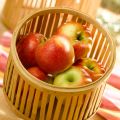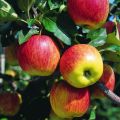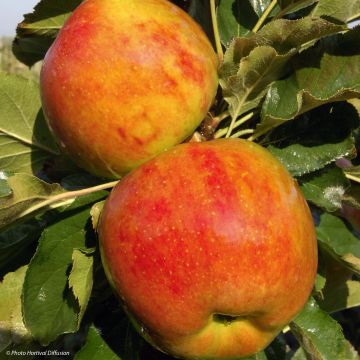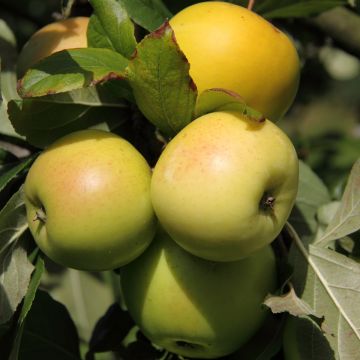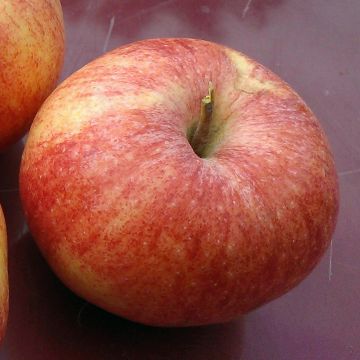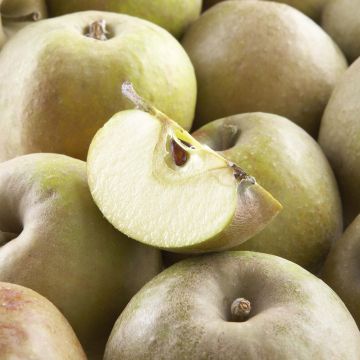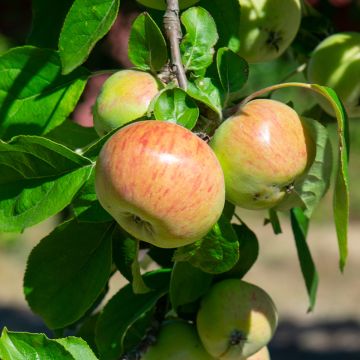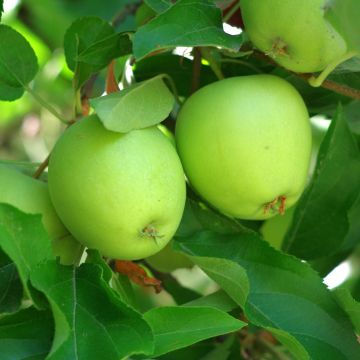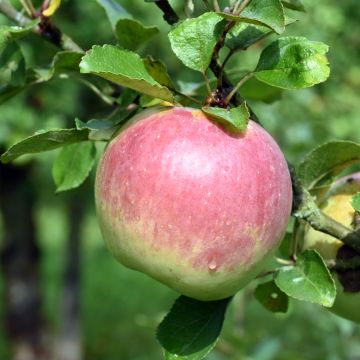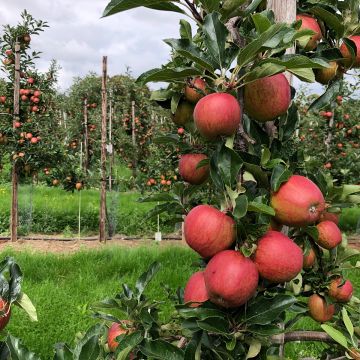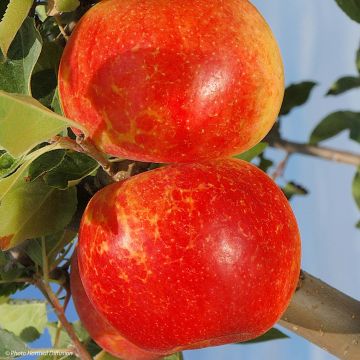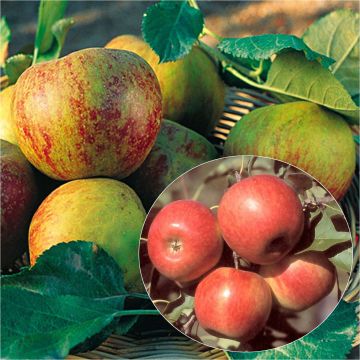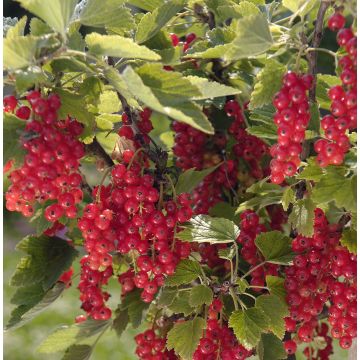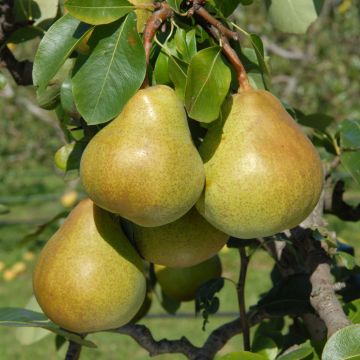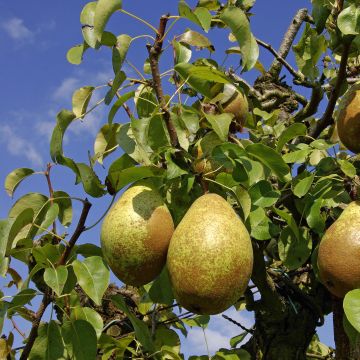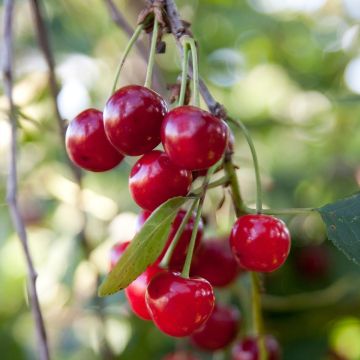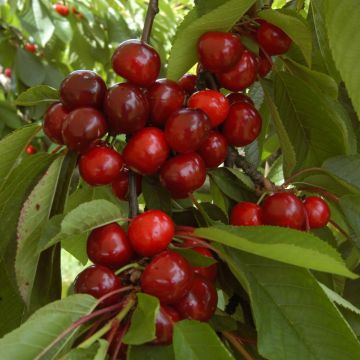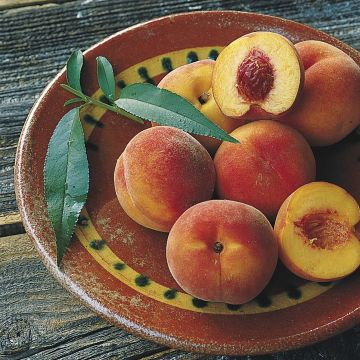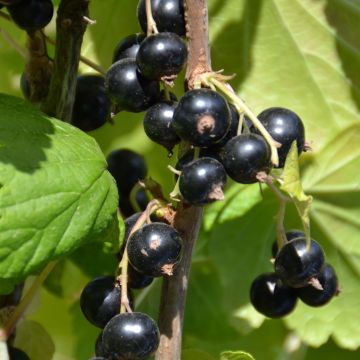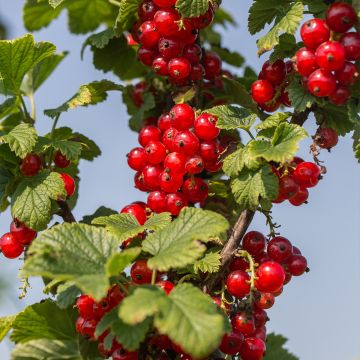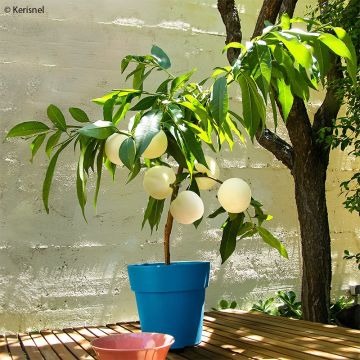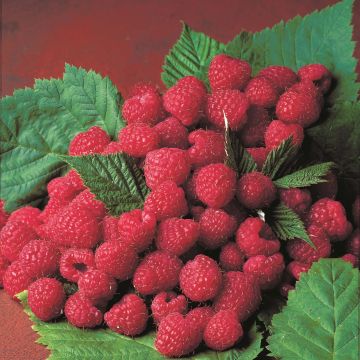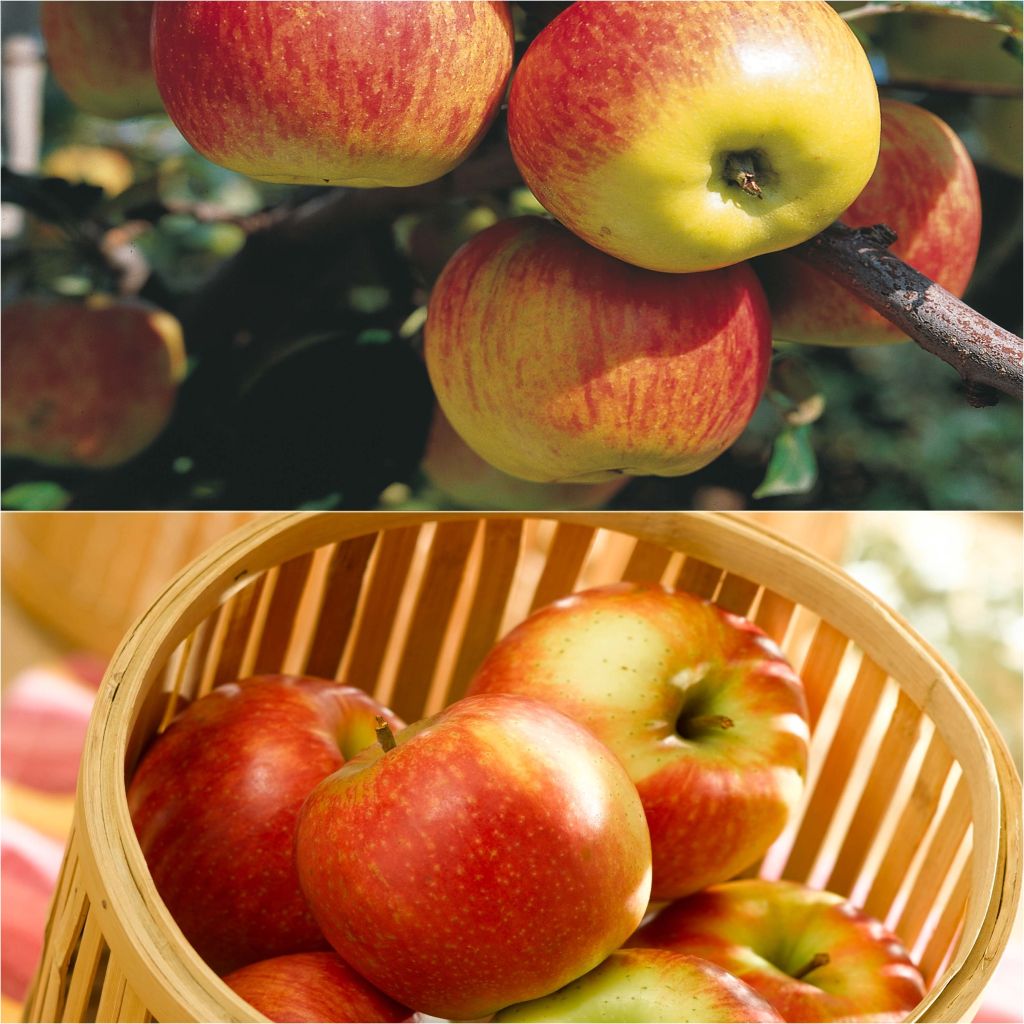

Delbard table apple pollinator duo with spreading harvest
Delbard table apple pollinator duo with spreading harvest
Malus domestica Delbarestivale® 'Monidel', Delbard Jubilé® 'Delgollune'
This plant carries a 6 months recovery warranty
More information
We guarantee the quality of our plants for a full growing cycle, and will replace at our expense any plant that fails to recover under normal climatic and planting conditions.
From €5.90 for pickup delivery and €6.90 for home delivery
Express home delivery from €8.90.
Collection items (2 plants)
Description
This Delbard Table Apple Pollinator Duo with Spread Harvest brings together the varieties 'Delbard Summer' and 'Delbard Jubilee', selected for their delicious apples and staggered production timing. Planted in the same garden, these two apple trees cross-pollinate each other, ensuring a good fruit yield. The abundant and spread-out harvest begins in August and ends in October.
This duo consists of:
- x1 'Delbard Summer' Monidel Apple Tree: a very early variety whose apples reach ripeness from the end of August and can be harvested until September. Yellow with red stripes, these medium-sized apples have firm, crunchy flesh and a balanced, refreshing flavor. They have a fragrant aroma of fennel mixed with anise. They are best enjoyed immediately after harvest and can be stored well. This variety is fairly resistant to diseases (including scab) and adapts well to all regions of France. This apple tree is not self-fertile, so it should be planted near varieties that bloom at the same time, in late April, such as 'Delbard Jubilee', to ensure pollination.
- x1 'Delbard Jubilee' Delgollune Apple Tree: a productive variety with fruit that is colored red and gold, offering fine, crunchy, juicy, and sweet flesh. It has a delightful aroma of honey, hazelnut, and banana, which gourmets appreciate. The fruits are harvested in October and can be consumed immediately, while also keeping well until February. These are very good table apples that can also be cooked. They grow on a vigorous, hardy tree that is not very susceptible to diseases. To obtain large-sized fruits, it is recommended to thin out the fruits at the beginning of summer. The 'Delbard Jubilee' apple tree sometimes exhibits a tendency for alternate bearing, so pruning for fruit production is also advisable. This apple tree is not self-fertile and will be pollinated by 'Delbard Summer'.
The apple tree (Malus domestica) is a fruit tree that belongs to the Rosaceae family. It is cultivated almost everywhere in the world and includes an infinite number of varieties, both old and modern, that produce apples of varying sizes and flavors, ranging from sweet to tart. Apple trees are native trees in Europe, including France, where their presence has been documented since ancient times. They are hardy, with some varieties tolerating temperatures as low as -30°C (1°F), and can be grown throughout France.
The height of domestic apple trees does not exceed ten meters, with a similar width. However, the size can be much smaller depending on the vigor of the rootstock used. These fruit trees usually have a tall trunk that naturally spreads out. They come in various forms (bush, half-standard, standard, etc.) and can be trained in many ways (as columns, cordons, espaliers, etc.).
Apple trees can be grown in all climates, but they particularly thrive in temperate regions that are somewhat humid. They prefer full sun and reasonably moist, fertile soil. Traditionally, they are planted in the heart of an orchard, but they can also be grown as standalone trees or even hedges. Apple trees are easy fruit trees to cultivate, requiring at least some thinning pruning. A proper fruiting pruning will prevent the alternate bearing phenomenon (fruiting every other year). An annual or biennial application of well-decomposed compost also promotes apple tree productivity.
These two fruit trees are delivered in a “ready-to-plant” root ball. During planting, the root ball should be planted as is. The biodegradable container that surrounds the root ball and preserves the rootlets will decompose naturally as the plant grows. By following this method, you ensure better establishment.
Report an error about the product description
Plant habit
Fruit
Flowering
Foliage
Botanical data
Malus
domestica
Delbarestivale® 'Monidel', Delbard Jubilé® 'Delgollune'
Rosaceae
Cultivar or hybrid
Other Apple trees
Planting and care
Choose a sunny location for your Apple tree, the soil can be slightly chalky or acidic but without excess. Dig a wide planting hole at least 3 times the volume of the root ball. Simultaneously add organic matter (potting soil, compost.) and a base fertilizer such as crushed bone. Do not bury the graft collar. Stake if necessary. Water abundantly, even in winter, even if it rains. Fruit trees are ideally planted between October and March, outside the freezing period. Container-grown plants can be planted year-round except during periods of high heat or frost.
You can add a small handful of wood ash, rich in potash, during the winter, this will improve fruiting. Watch out for potential aphid attacks during the season. A white coating caused by a fungus, powdery mildew, may appear on the leaves in summer, which does not harm fruit development in gardens. Only keep harvested fruits. Apples are best stored with the stem end down, on shelves or in crates. Choose a preferably completely dark, dry, cool but frost-free location.
Planting period
Intended location
Care
This item has not been reviewed yet - be the first to leave a review about it.
Georges Delbard fruit trees
Haven't found what you were looking for?
Hardiness is the lowest winter temperature a plant can endure without suffering serious damage or even dying. However, hardiness is affected by location (a sheltered area, such as a patio), protection (winter cover) and soil type (hardiness is improved by well-drained soil).

Photo Sharing Terms & Conditions
In order to encourage gardeners to interact and share their experiences, Promesse de fleurs offers various media enabling content to be uploaded onto its Site - in particular via the ‘Photo sharing’ module.
The User agrees to refrain from:
- Posting any content that is illegal, prejudicial, insulting, racist, inciteful to hatred, revisionist, contrary to public decency, that infringes on privacy or on the privacy rights of third parties, in particular the publicity rights of persons and goods, intellectual property rights, or the right to privacy.
- Submitting content on behalf of a third party;
- Impersonate the identity of a third party and/or publish any personal information about a third party;
In general, the User undertakes to refrain from any unethical behaviour.
All Content (in particular text, comments, files, images, photos, videos, creative works, etc.), which may be subject to property or intellectual property rights, image or other private rights, shall remain the property of the User, subject to the limited rights granted by the terms of the licence granted by Promesse de fleurs as stated below. Users are at liberty to publish or not to publish such Content on the Site, notably via the ‘Photo Sharing’ facility, and accept that this Content shall be made public and freely accessible, notably on the Internet.
Users further acknowledge, undertake to have ,and guarantee that they hold all necessary rights and permissions to publish such material on the Site, in particular with regard to the legislation in force pertaining to any privacy, property, intellectual property, image, or contractual rights, or rights of any other nature. By publishing such Content on the Site, Users acknowledge accepting full liability as publishers of the Content within the meaning of the law, and grant Promesse de fleurs, free of charge, an inclusive, worldwide licence for the said Content for the entire duration of its publication, including all reproduction, representation, up/downloading, displaying, performing, transmission, and storage rights.
Users also grant permission for their name to be linked to the Content and accept that this link may not always be made available.
By engaging in posting material, Users consent to their Content becoming automatically accessible on the Internet, in particular on other sites and/or blogs and/or web pages of the Promesse de fleurs site, including in particular social pages and the Promesse de fleurs catalogue.
Users may secure the removal of entrusted content free of charge by issuing a simple request via our contact form.
The flowering period indicated on our website applies to countries and regions located in USDA zone 8 (France, the United Kingdom, Ireland, the Netherlands, etc.)
It will vary according to where you live:
- In zones 9 to 10 (Italy, Spain, Greece, etc.), flowering will occur about 2 to 4 weeks earlier.
- In zones 6 to 7 (Germany, Poland, Slovenia, and lower mountainous regions), flowering will be delayed by 2 to 3 weeks.
- In zone 5 (Central Europe, Scandinavia), blooming will be delayed by 3 to 5 weeks.
In temperate climates, pruning of spring-flowering shrubs (forsythia, spireas, etc.) should be done just after flowering.
Pruning of summer-flowering shrubs (Indian Lilac, Perovskia, etc.) can be done in winter or spring.
In cold regions as well as with frost-sensitive plants, avoid pruning too early when severe frosts may still occur.
The planting period indicated on our website applies to countries and regions located in USDA zone 8 (France, United Kingdom, Ireland, Netherlands).
It will vary according to where you live:
- In Mediterranean zones (Marseille, Madrid, Milan, etc.), autumn and winter are the best planting periods.
- In continental zones (Strasbourg, Munich, Vienna, etc.), delay planting by 2 to 3 weeks in spring and bring it forward by 2 to 4 weeks in autumn.
- In mountainous regions (the Alps, Pyrenees, Carpathians, etc.), it is best to plant in late spring (May-June) or late summer (August-September).
The harvesting period indicated on our website applies to countries and regions in USDA zone 8 (France, England, Ireland, the Netherlands).
In colder areas (Scandinavia, Poland, Austria...) fruit and vegetable harvests are likely to be delayed by 3-4 weeks.
In warmer areas (Italy, Spain, Greece, etc.), harvesting will probably take place earlier, depending on weather conditions.
The sowing periods indicated on our website apply to countries and regions within USDA Zone 8 (France, UK, Ireland, Netherlands).
In colder areas (Scandinavia, Poland, Austria...), delay any outdoor sowing by 3-4 weeks, or sow under glass.
In warmer climes (Italy, Spain, Greece, etc.), bring outdoor sowing forward by a few weeks.

































